- Home
- Anthony Burgess
ABBA ABBA Page 9
ABBA ABBA Read online
Page 9
"I do not, Severn, I do not not not. Nor do I proceed to the consummation with speed enow. You see, I do not curse the brevity of this my allotment, for your three score and ten superstition puts silly value on the straight line of the geometers, which has length but not thickness. I have had thickness enough, God knows, and now I am hawking up the thickness – blood less and less, a rank porridge more and more. I regret only that I was denied the one sweetness Lord Byron would have crushed carelessly between his fine teeth, like a horse grinding a sugar lump. He would have taken her if he could and then confounded the memory of her caresses with a myriad others, not even remembering her name – Fanny something, but there have been so many Fanny somethings. So my craving was not inordinate, Severn, and it was denied.
"I reserve a special curse for Society, which has as ultimate head of its Executive the Life Hater. Ah, how Society feels itself threatened by the human senses! Even the chomp and honey drip of language, made of sense and bound to sense as it is, must be squeezed dry by Society. And yet I, disregarded small poet, am one of the sustainers of Society and, in a sense, must die for it. When will it be, Severn, the end? I curse you again and I curse Clark for withholding the drowsy quietus. Curse you and your fucking nasty perverted gentle Jesus whining about the sanctity of life. Curse every follicle, each footsole's grimy whorl, each inbreath and eke each outbreath, muddy Severn, torturer. I will haunt your grey age, enemy."
Severn heard none of this.
Severn heard Dr Clark's words with buzzing ears, squinting at him with aching eyes in the cool sunlit afternoon at the foot of the Spanish Steps. It was almost Christmas and Abruzzese bagpipes droned and wailed on the light wind.
"You look near dead, man." Clark spoke English with a Scotch tune. "You cannot put up much longer with this waking and watching. You'll be screaming soon, screaming at a screamer. I must bring a nurse in."
"We have not the money."
"Never mind about the money. You can, I'm sure, get more money from the men who brought out his poems. Did not those poems just lately go into another edition?"
"That was John's joke, God help him. He said for me to write to Taylor there would be a second printing. In cold sheets were his words. It is his grave humour you must call it. I see no prospect of money. Dying is as expensive as living."
The physician Clark had summoned for a second opinion was further up the Steps, talking to Don Benedetto of the church up there. He was a Roman believed by some to have the evil eye and named only by his initials, M.P.
"What are they talking of?" Severn said fretfully. "I don't like this hand-waving and shrugging and pointing back at the house. John raves and screams, true, but he cannot help it. I suppose they will have it there's a devil in him." He muttered: "So there is, God forgive me for saying it."
"Passing the time of day, no more," Clark soothed. "You must take small notice of these Roman gestures." And then: "He's a good doctor, so good that they think there's witchcraft in him, some. He confirmed my diagnosis and prognosis. And the treatment too. So you're not to worry any more about that."
"The starvation is to go on? And the blood letting?"
"It's only the way, laddie. It's the coughing up of the blood that kills him with the weakness. He must take no more blood in. The diet of steamed fish is the right one. And not too much of that either."
"He's ceased giving out blood, you know that."
"There you are, then."
"He casts up some thick grey substance. Keats's porridge he terms it. More of his murky humour."
"He's a noble animal, God help him."
"Is there no more you can do than bleeding and starving?"
"Ask the man up there if there's more. He's seen consumption enough in his time. Half the town has it."
"So we bring our English consumptives to a town where half have it. I see."
"Come now, Rome's climate often has a fine effect on northern sufferers. John Keats's life will go on longer than it would have in Hampstead. I wager we'll prolong it to the spring."
"For what purpose? For what purpose do you prolong it?"
"Come now, Severn, you must not ask that question. That's the atheistical question that our poor friend asks. Don't let him infect you."
"I'm close to him all day and all night too," Severn said in a high strained voice. "It's hard to avoid that risk."
"Pull yourself together, man. I'll get that nurse tomorrow."
"Oh, I've help enough. Ewing comes and the Spaniard Llanos. The English chaplain too, but John will not have him. He persists in cursing the Christian faith." Severn began to snivel.
"Aye, well, you must keep yourself strong for that duty. You must not let him go out an atheist with his blather about the creative imagination and the rest of the poetic godlessness. God forgive me for saying that. He's a better man than most of the Christians I know. But our view of him isn't necessarily the Almighty's."
Severn went back in to a quieted emaciated John with eyes like lamps. The voice was not the voice Severn had known even a month back. It was higher and sharper, like an old man's, the Cockney vowels more pronounced, the tones too often those of malignity. "So, Severn, they've confirmed that I'm dying in my stomach, yes? The lungs are pink and spongy and bursting with healthful air. And I'm to go on being starved, yes? Listen, Severn, I ask you no more to buy me laudanum, but I do ask that you bring me in a beefsteak, cold maybe but well-cooked. See, my mouth oozes for a beefsteak."
"You know I cannot, you know it will only bring the blood. I must obey the -"
"Always obey, Severn, and you will get on in the world. Obey the dictates of Society and Medicine and the Edinburgh Arbiters of Art and you will be a baronet some day. Very well, read me something."
"Jeremy Taylor? Holy Living and Holy Dying?"
"I like it for the wrong reasons, you know that, Severn."
"How do you know it is for the wrong reasons? I think perhaps you like to convince yourself that the spirit is not at last working on you. But I see differently."
"Bugger the spirit, Severn. Read."
Severn read: "There is no state, no accident, no circumstance of our life, but it hath been soured by some sad instance of a dying friend: a friendly meeting often ends in some sad mischance, and makes an eternal parting: and when the poet Aeschylus was sitting under the walls of his house, an eagle hovering over his bald head mistook it for a stone, and let fall his oyster, hoping there to break the shell, but pierced the poor man's skull.' "
John laughed. "I had always thought it was a tortoise the eagle dropped, but still – You see what I mean, Severn, about the wrong reasons. Taylor is lively, there is no gloom of death in him. Read on."
" 'Death meets us everywhere, and is procured by every instrument and in all chances, and enters in at many doors; by violence and secret influence, by the aspect of a star and the stink of a mist, by the emissions of a cloud and the meeting of a vapour, by the fall of a chariot and the stumbling at a stone, by a full meal or an empty stomach -' "
"That bites hard, Severn, very hard."
" '- By watching at the wine or by watching at prayers, by the sun or the moon, by a heat or a cold, by sleepless nights or sleeping days, by water frozen into the hardness and sharpness of a dagger, or water thawed in the floods of a river, by a hair or a raisin, by violent motion or sitting still, by severity or dissolution, by God's mercy or God's anger; by everything in providence and everything in manners, by everything in nature and everything in chance -' "
"He takes such pleasure in his doublets. Hair or raisin, indeed. There's no death in it at all."
" '- Eripitur persona, manet res; we take pains to heap up things useful to our life, and get our death in the purchase; and the person is snatched away, and the goods remain. And all this is the law and constitution of nature; it is a punishment of our sins, the unalterable event of providence, and the decree of heaven: the chains that confine us to this condition are strong as destiny, and immutable as the eternal law
s of God.' " Severn looked up. "May I stop there? I can hardly keep my eyes open."
"Sleep then. I shall not leap out of bed to buy beefsteaks or laudanum." And then: "Poor Severn. Poor Joseph. Did they call you Joe at home?" Severn nodded and the nod turned to a nodding off which he jerked himself out of abruptly when John said: "Sometimes in the night's deep watches I anagrammatise my name, give its constituent letters to such things of the world to survive as will take them. Keats takes steak. Alas, he does not. Stake takes Keats. A different stake, for martyr's burning. John Keats thanks Joe. And so the name is pulled apart and there is an end to it. Have you made arrangements for my Protestant burial yet?"
"I would – I have -"
"Sleep, sleep, Joe. Ah, alas, you cannot yet." For there was a knocking at the door of the apartment. Severn tottered from John's bedroom to open up to Signora Angeletti, very voluble with much hand work, and two stolider persons, men in stained blue uniform. Severn could not well understand what was being said. These were officials of some sort, sent by whom? Signora Angeletti babbled on about la legge, la legge. "Bring them in to me," called John.
They stood then at the bed's foot. One of the men, smelling death, made a sign of the cross with great speed. Signora Angeletti spoke on and on, apologetic, bold, sympathetic, asserting her rights.
"What is it?" Severn said. "What in God's name -"
"Wait." And John heard her out and heard what she said confirmed more briefly in the Roman basso of the elder of the two men. "It's the law, Severn. Everything is to be burnt at the stake – furniture, books, the very wallpaper. I am a source of infection to the city. I am to be allowed to die first, but then comes the burning."
"It's that man Clark brought, it's that damnable priest at the top of the Steps -"
"It's the law, Severn. La legge, capisco," he said to Signora Angeletti and the two men. They all nodded, thankful to be understood. Nothing personal, they would that the signore could live and flourish, but as he was dying and they had it on medical authority confirmed by the Church that he was then there was nothing for it but the burning and they were sincerely sorry about the expense. "We have to find the money, Severn. To replace what is to be burnt. La legge, you understand. I'm truly sorry, truly. I take back what I said about wishing to die quickly. I must die slowly and grant you time to raise the money." Severn raised pathetic fists towards his temples and was ready to scream. "Calm, calm. There will be time, I promise you. I will expire slowly, like a good boy."
NINE
John Keats's nightly music was from a tiny fountain in the shape of a boat; Belli's was the torrent of Trevi, which he lived above. He and his wife had an apartment in the Poli palazzo, whose windows, like the eyes of the sculpted figures that preside over the waters, looked straight on to the pool and the jets that thrashed into it. Belli was in his study with Gulielmi a week after Epiphany, both standing, both looking down absently into the foam rainbowed by the bright noon. Gulielmi was just back from the north. He had announced that Carlo Porta was dead. He had died of gout the day before Epiphany.
"I should have gone to Milan to see him," Belli said. "He was a great poet."
"A great dialect poet."
"Dialect, dialect, dialect. What in God's name is the difference between a language and a dialect? I'll tell you. A language waves flags and is blown up by politicians. A dialect keeps to things, things, things, street smells and street noises, life."
"Well, now your way is clear. You must replace Porta. No, don't burst out again. As the great poet of dialect. Yes, I know, comparing Milanese and Roman is like comparing French and Spanish, but I mean what you mean – things, appetites, feelings, odours, people, not the big bannered abstractions."
"I've thought of this," Belli said. "Thought of it especially since the great man offered me the great position. Belli on the side of the State, gelder of thought and speech in the service of stability. Belli at nightfall, saving his reason through scurrility. All literature is subversive, somebody said. Voltaire? A repressive office will force me into a metier of subversion. I acknowledge myself to be a split man."
"We're all split. Meat is disgusting, some Englishman said, but it's also delicious. The act of love is bestial but also ecstatic."
"Stability saved through scurrility. Subversion the prop of social order."
"It's the literature that counts. You embrace a kind of martyrdom to write what you have to write. Have you considered what you have to write?"
"Stuff for tavern recitation with the doors closed. Totally unpublishable."
"But what?"
"Time, time, I must be given time. I'm not ready."
The furnishings of the study expressed the contradictions in the man – a plain deal kitchen table, a tavern chair and a chair of French provenance, very fine, an old prie-dieu with stuffed satin well knee-worn, a lectern with an open Jerome, a Jacobin etching showing a generic pope as a feeder of children to a greybeard cannibal God, Lotto's Annunciation (a bad copy) with its cat running scared from Gabriel. On the table was John Keats's cat sonnet, with a literal translation by Gulielmi.
"That boy there," Gulielmi said, "spoke to me of a great long poem about Rome – changing Rome and the unchanging Roman. My heart ached with pity when he told me. I knew it was not for him."
"Changing Rome, indeed. Rome doesn't change, Rome must not be viewed temporally. No work for an outsider. But he's on the right lines in another way. I'm sorry I sneered at this cat sonnet of his."
"Whatever you do, Belli, for God's sake don't take that poem as typical. He's not that kind of poet at all. He's a poet of nature, romance, fairyland, heartache, the classical world as seen in a rainy English garden. That cat sonnet's a mere joke."
"Joke or not, he's on the right lines there. The sonnet form can be dragged low, must be dragged low. The time has come to reject its Petrarchal coronation. You see, God is in cabbage patches and beer-stains on a tavern table. Do you follow me?"
"No."
"I was so bitterly ashamed of that cazzo sonnet – you remember it?"
"Can I ever forget?"
"One must trust one's instinct more. I was really proclaiming the glory of God. Do you follow me?"
"No."
"Never mind. I have some Madeira here. A present from – Never mind. Do you like Madeira?"
"With a biscuit. Do you have a biscuit?"
Belli opened his battered escritoire and disclosed bits of old food – cheese, stale bread, a hunk of salami tough as pemmican. "I sometimes," he said apologetically, "need a little something when working late. Here are English biscuits. That Spanish fellow gave them to me. Pianos?"
"Llanos. Hm, still eatable." Belli poured sweet golden wine. "Hm, not bad really."
"Perhaps," Belli said, having sipped, "I should not say the glory of God. Perhaps, as ever, I go too far." Gulielmi waited, having expected this. "You see, I will end with some – You see, only the other day I heard a Roman workman saying how much he hated work. He said it was hypocritical of priests, who do nothing anyway, extolling the virtues of toil, when the final virtue is to do nothing. In heaven, this man said, the male saints do nothing all day except play with their balls while the female saints merely scratch their cunts." Gulielmi laughed until he choked on biscuit crumbs. Belli remained grave. "I see that," he said, "as a perfect sonnet. I even heard the rhymes lining themselves up. It has to be set down, aromatic Roman speech haloed by a sonnet. How can I talk about doing it to the glory of God?" He seemed genuinely distressed.
"The glory of man," Gulielmi said, after coughing. "But never mind. And now let me tell you what your task is. This boy Keats – whom I must go to visit, and soon, before it is too late – Keats, I say, dreamed that his big Roman poem could be all in sonnets. He was, even if he were to live, the wrong man for it. The work is reserved to you. You depict unchanging Rome through its many voices. You write two thousand, three thousand sonnets. All about dirty cynical suffering rejoicing Rome, and all in Roman voices. Not your voice
, not that. Their voices. Why should that make you feel guilty?"
"I'm tempted," Belli said. "Sorely tempted, God help me." He raised his fist to his breast as though to beat it, then opened his fist to grasp his Madeira glass. He sketched, before drinking, a shy gesture of toasting the project.
TEN
"I have conversed with some men who rejoiced in the death or calamity of others, and accounted it as a judgment upon them for being on the other side, and against them in the contention: but within the revolution of a few months, the same man met with a more uneasy and unhandsome death: which, when I saw, I wept, and was afraid; for I knew that it must be so with all men; for we also shall die, and end our quarrels and contentions by passing to a final sentence."
He read no more Jeremy Taylor. He read no more of anything. Wells and the Edinburgh Review would be judged in God's good time, whoever or whatever God was. He was to die without the consolation granted to the horniest-handed ploughman. He was content. It was enough to be born to the morning sun and the morning milk and account this waking a sort of triumph.
He was too weary to try to separate out the imagined, the dreamt and the quotidian real. Breathing became a craft to be practised with painful attention. If he slept the craft might be removed from him.
Many stood or sat by his bed. Llanos said he would go to England and speak to those left. Gulielmi said that Belli could not visit him, having now much on his mind, but he apologised for his brutal want of courtesy that evening so far back and wished to express admiration for such of a fellow-poet's work as he could, with Gulielmi's help, be brought to understand. The Princess Borghese, Pauline Bonaparte, came looking for the handsome Elton. Elton himself obligingly appeared, on his way to Switzerland, and coupled with her on John's bed, John obligingly tucking his feet up to make room. His own dear girl came in black and said that mourning altogether forbade even the most mildly wanton loveplay.

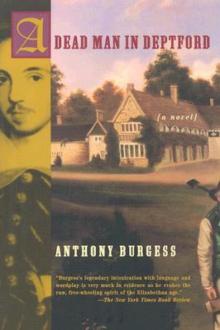 A Dead Man in Deptford
A Dead Man in Deptford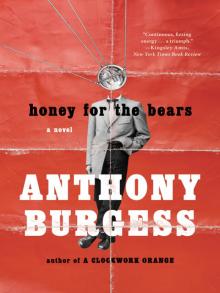 Honey for the Bears
Honey for the Bears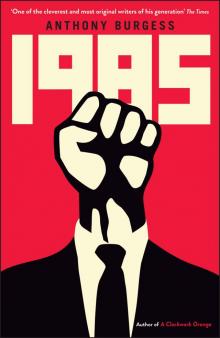 1985
1985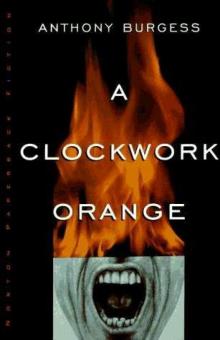 A Clockwork Orange
A Clockwork Orange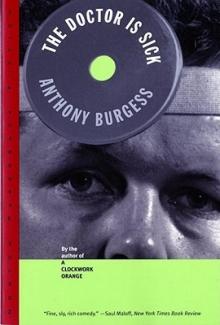 The Doctor Is Sick
The Doctor Is Sick Earthly Powers
Earthly Powers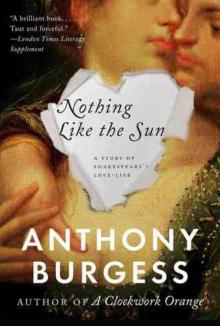 Nothing Like the Sun
Nothing Like the Sun Collected Poems
Collected Poems The Kingdom of the Wicked
The Kingdom of the Wicked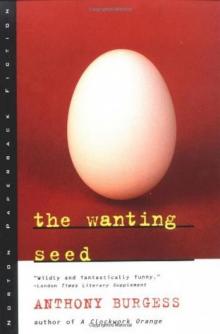 The Wanting Seed
The Wanting Seed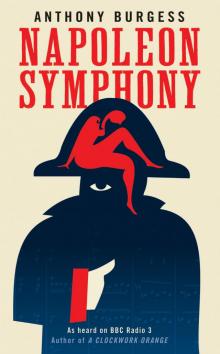 Napoleon Symphony
Napoleon Symphony The Malayan Trilogy
The Malayan Trilogy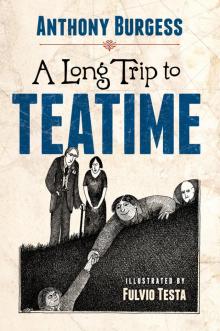 A Long Trip to Teatime
A Long Trip to Teatime Enderby Outside
Enderby Outside M/F
M/F The Complete Enderby
The Complete Enderby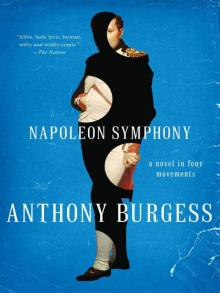 Napoleon Symphony: A Novel in Four Movements
Napoleon Symphony: A Novel in Four Movements Enderby's Dark Lady
Enderby's Dark Lady The Clockwork Testament (Or: Enderby 's End)
The Clockwork Testament (Or: Enderby 's End) ABBA ABBA
ABBA ABBA A Clockwork Orange (UK Version)
A Clockwork Orange (UK Version)